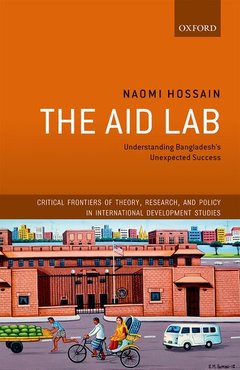The Aid Lab Understanding Bangladesh's Unexpected Success Critical Frontiers of Theory, Research, and Policy in International Development Studies Series
Langue : Anglais
Auteur : Hossain Naomi

From an unpromising start as 'the basket-case' to present day plaudits for its human development achievements, Bangladesh plays an ideological role in the contemporary world order, offering proof that the neo-liberal development model works under the most testing conditions. How were such rapid gains possible in a context of chronically weak governance? The Aid Lab subjects this so-called 'Bangladesh paradox' to close scrutiny, evaluating public policies and their outcomes for poverty and development since Bangladesh's independence in 1971. Countering received wisdom that its gains owe to an early shift to market-oriented economic reform, it argues that a binding political settlement, a social contract to protect against the crises of subsistence and survival, united the elite, the masses, and their aid donors in the wake of the devastating famine of 1974. This laid resilient foundations for human development, fostering a focus on the poorest and most precarious, and in particular on the concerns of women. In chapters examining the environmental, political and socioeconomic crisis of the 1970s, the book shows how the lessons of the famine led to a robustly pro-poor growth and social policy agenda, empowering the Bangladeshi state and its non-governmental organizations to protect and enable its population to thrive in its engagements in the global economy. Now a middle-income country, Bangladesh's role as the world's laboratory for aided development has generated lessons well beyond its borders, and Bangladesh continues to carve a pioneering pathway through the risks of global economic integration and climate change.
Naomi Hossain is a Research Fellow at the Institute of Development Studies (IDS) at the University of Sussex. She previously worked at BRAC's Research and Evaluation Division in Bangladesh, and led on BRAC University's first State of Governance in Bangladesh report in 2006. She now focuses on the popular politics of subsistence crises around the world, leading major studies on food riots and on everyday life in a time of food price volatility. She is the author of Elite Perceptions of Poverty in Bangladesh (2005; Dhaka: University Press Limited).
Date de parution : 02-2017
Ouvrage de 262 p.
16x24.1 cm
Thème de The Aid Lab :
© 2024 LAVOISIER S.A.S.



